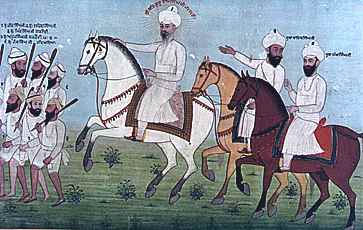Namdhari Shaheeds -
Foremost Freedom Fighters

The Deputy Commissioner of Amritsar, in consultation with Rai Takhat Mal and other Hindu Punches (representatives) opened a slaughter-house outside the city. The butchers were instructed to follow the following instructions. "The cows will be slaughtered at a particular place within an enclosure. No butcher shall bring beef inside the city for the purpose of sale. Transgressors of these rules will be punished".
The opening of a kine slaughter-house at Amritsar was a signal for the opening of many more in different towns throughout the Punjab. The butchers started the killing of cows in small towns too. Although the Muslim population of the Punjab did not cherish beef as a food, the British officers again and again impressed upon their minds that the right of kine-killing was sanctioned by their religion. The underlying motive was to divide the Punjabis into religious groups and destroy their unity.
Since the starting of a slaughter-house at Amritsar, relations between the Hindus and Muslims of the city, have been growing tense. The Muslim butchers start-ed the sale of beef openly in the streets of Amritsar. On 7th May 1856, a culprit involved in such a crime was produced before Mr. F. Cooper. In May 1863, a Muslim selling beef in a street populated by the Hindus, was caught red-handed. Two magistrates tried the case; one of them was a Hindu and the other a Muslim. The culprit was sentenced to 3 months' imprisonment and a fine. of Rs. 50. The magistrates unanimously remarked that the sale of beef was not permitted in the city.. A The Judicial Commissioner in his judgement on an appeal in. this case, released the accused, saying that such an order did not exist, in the Government records
After the first Anglo-Sikh war, a British Resident was appointed to assist the administration of the truncated Punjab under Maharaja Dalip Singh, a minor son of Maharaja Ranjit Singh. In a short time, the Resident became the virtual ruler. British diplomacy acted in a vicious circle. Bitter feelings were created between the nobles of the court. Intrigues were fomented and the courtiers formed 'themselves into groups and factions. The British soldiers were too impudent to respect the sentiments of the Sikhs, whom they now took as their conquered subjects. The Sikhs, in general, resented the attitude of the British soldiers, towards them. In order to allay bad feelings spreading against the British, a copper plate engraved with the following orders under the signature of the Resident Henery M. Lawrence, was stuck on the main gate of the Golden Temple Amritsar-the chief Sikh shrine.
"The Priests of Amritsar having complained of annoyances, this is to make known to all concerned that by order of the Governor-General, British subjects are forbidden to enter the temple (called the Darbar) or its precincts, at Amritsar, or indeed, any temple, with their shoes on. Kine are not to be killed at Amritsar, nor are the Sikhs to be molested or in any way interfered with. Shoes are to he taken off at the Bhoongas at the corner of the tank. No person is to walk round the tank with his shoes on." Lahore, (Sd.) Henery M. Lawrence, March 24th, 1847. Resident.
From the nature of the order, it is clear that the British subjects, popularly known as Whites or Feringhees used to enter the Golden Temple and its precincts with their shoes on. Cows were slaughtered at Amritsar for beef-eating British soldiers. The order was issued when Maharaja Dalip Singh was still on the throne of the Lahore Darbar.
The second Anglo-Sikh war was forced upon the Lahore Darbar by the British statesmen, in pursuance of their policy for reaching nearer the border of the Russians in Central Asia., The Sikhs were defeated in several battles. Maharaja Dalip Singh was dethroned. Punjab was annexed to the British Indian Empire on the 29th March 1849. According to the circular letter No.3, dated 5th May 1849, the Board of Administration prohibition on cow slaughter was lifted. Some of the Deputy Commissioners requested for more clarification of these instructions, objecting to the practice of openly killing cows and selling of beef by the Mohammadens. One of them even argued that such a privilege will certainly be misused by the Mohammadans to annoy and injure the religious feelings of their Hindu and Sikh neighbours.
The British were anxious to consolidate their power in the Punjab. They adopted the policy of dividing the population on religious and communal bases. They wanted to bring the Muslim masses nearer them. In pursuance of this policy, and in utter disregard of the old practices and sentiments of the Hindus and Sikhs, the governor-general issued another order on the 20th May 1849, in the following words.
'No one should be allowed to interfere with the practice by his neighbor, and of customs which that neighbour's religion either enjoins or permits."
The order in clearer terms encouraged the Muslims to practice cow-killing giving them the shelter of law, through-out the Punjab. The Board of Administration issued the following bye-laws regarding the slaughtering of cows.
1 Cows will be slaughtered at a particular place outside the town.
2. No shop will be opened in the town for the open sale of beef.